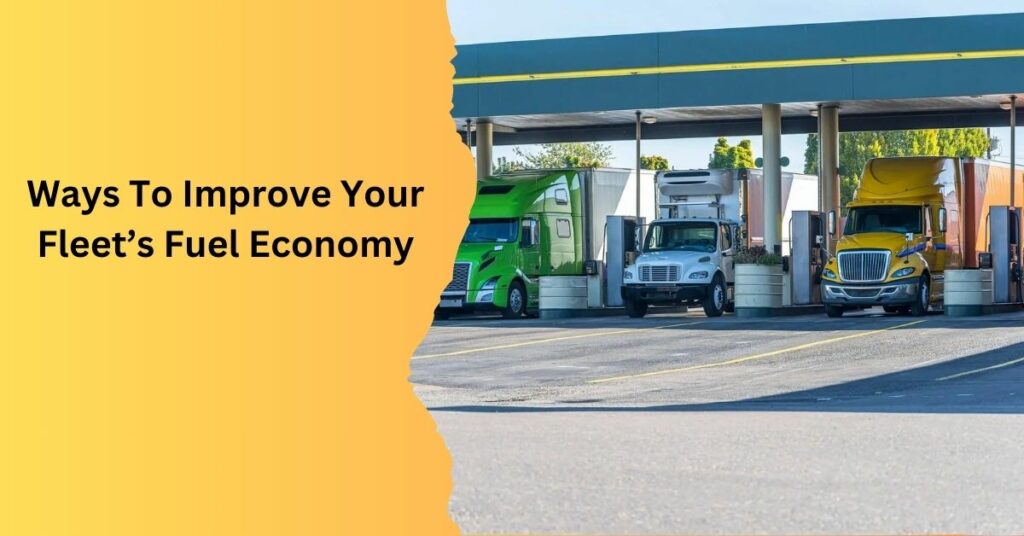Ways To Improve Your Fleet’s Fuel Economy

When looking for ways to improve your fleet fueling, look at vehicle maintenance. This can also include various factors, such as driving techniques, types of fuel and lubricants, and others. Here are some ways you can improve your fleet fuel economy:
Schedule Regular Vehicle Maintenance
Routine oil changes, proper tire inflation, and timely engine tune-ups can make a substantial difference in your fuel economy. Well-maintained vehicles operate more efficiently and can help reduce fuel consumption and extend the fleet’s lifespan. By partnering with a reliable fuel and lubricant supplier, you can access high-quality products that can contribute to the longevity and performance of your vehicles.
Utilize Advanced Driving Techniques
Encourage your drivers to adopt fuel-efficient driving habits. Ask them to use smooth acceleration and deceleration, maintain a consistent speed, and avoid unnecessary idling, as these factors can impact fuel consumption. Implement driver training programs to educate your team on the benefits of these techniques. Modern telematics systems can provide real-time feedback on driving behavior. This can help drivers make adjustments for better fuel efficiency.
Optimize Route Planning
Utilize advanced routing software that takes into account traffic conditions, road elevation, and other variables to determine the most fuel-efficient routes. By minimizing unnecessary detours and optimizing delivery schedules, you can save on fuel costs and improve overall fleet productivity. This can also help you have timely deliveries. Optimizing routes is a strategic approach to achieving this while minimizing environmental impact.
Upgrade to Fuel-Efficient Vehicles
Think about upgrading your fleet to include vehicles with enhanced capability features. Modern vehicles often come equipped with advanced technologies such as hybrid systems or fuel-efficient engines. While the initial investment may seem substantial, the long-term savings in fuel costs can make such upgrades financially beneficial. Consult with your fuel and lubricant supplier to explore options that align with your fleet’s specific needs and operational requirements.
Choose High-Quality Fuels and Lubricants
The quality of the fuel and lubricants you use can significantly impact your fleet’s performance. Opt for high-quality fuels that are formulated to enhance combustion and reduce emissions. Quality lubricants contribute to smoother engine operation, reducing friction and wear. Look for products that adhere to industry standards. This can help you make sure that your fleet operates at its best and minimizes its environmental footprint.
Implement Idle Reduction Policies
Excessive idling contributes to unnecessary fuel consumption and emissions. Implementing idle reduction policies within your fleet can lead to fuel savings. Utilize technology such as automatic engine shut-off systems or idle reduction devices to help make sure that vehicles are not idling when not in use. Monitoring and addressing idling practices can improve your overall fuel efficiency. This can positively impact both your operational costs and environmental sustainability goals.
Monitor and Analyze Fuel Consumption Data
Invest in fuel tracking and monitoring systems to gather data on your fleet’s fuel consumption. Analyzing this data can reveal patterns and trends that may indicate areas for improvement. Identify outliers, address potential issues promptly, and use the insights gained to make informed decisions. Regularly reviewing fuel consumption data allows you to create operational strategies and implement targeted measures to optimize fuel efficiency.
Increase Employee Engagement and Awareness
Create awareness of fuel efficiency within your organization by engaging employees. Raise awareness of the financial benefits of optimizing fuel consumption. Conduct workshops, training sessions, or awareness campaigns to educate drivers and fleet managers. These processes can help them understand their role in achieving fuel efficiency goals. Encourage feedback and suggestions from the front lines, as those directly involved in daily operations often have valuable insights. Recognize and reward fuel-efficient driving practices to motivate employees. A team that is actively involved and aware of the impact they can make will be more committed to implementing and sustaining fuel-saving measures.
Fleet Fueling For You
You can improve your fleet’s fuel economy by increasing employee engagement and awareness, monitoring and analyzing fuel consumption data, implementing idle reduction policies, and choosing high-quality fuel and lubricants. By employing these tips, you can help decrease your environmental impact and increase your fuel economy. Using these tips will also improve the fuel consumption data and any outliers. Find a high-quality fuel and lubricant distributor near you to ask about how their fleet fueling can help reduce your operating costs.






